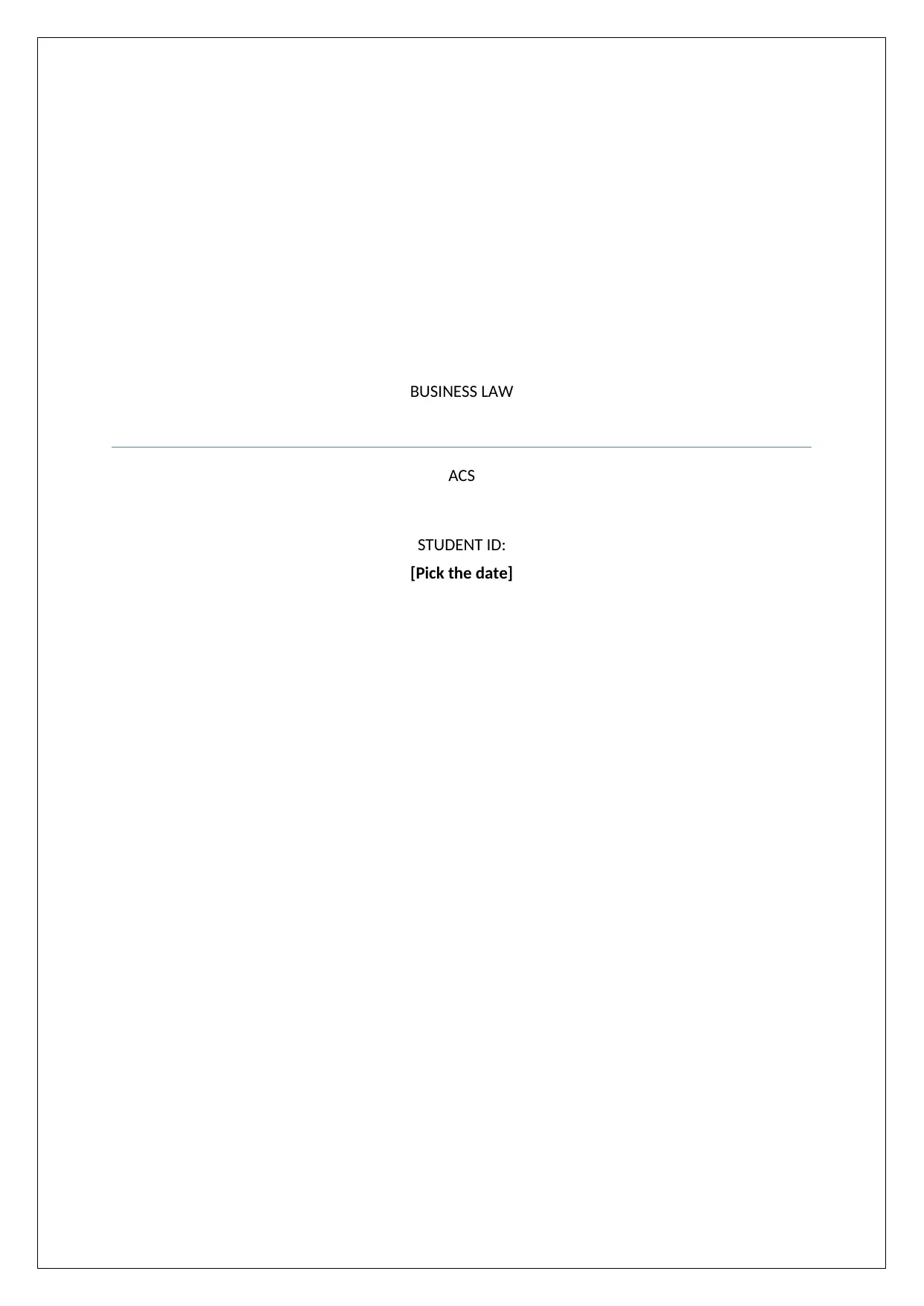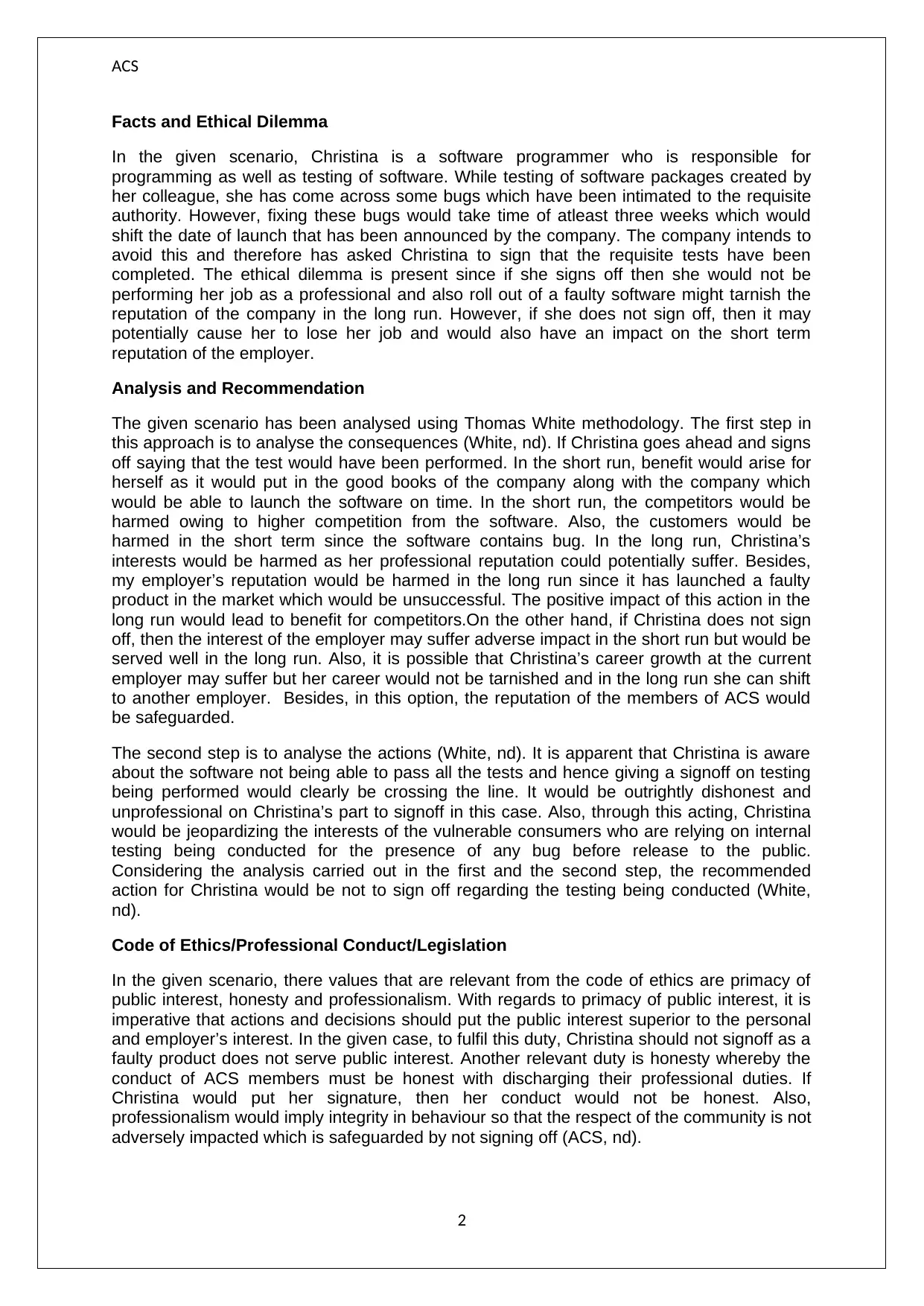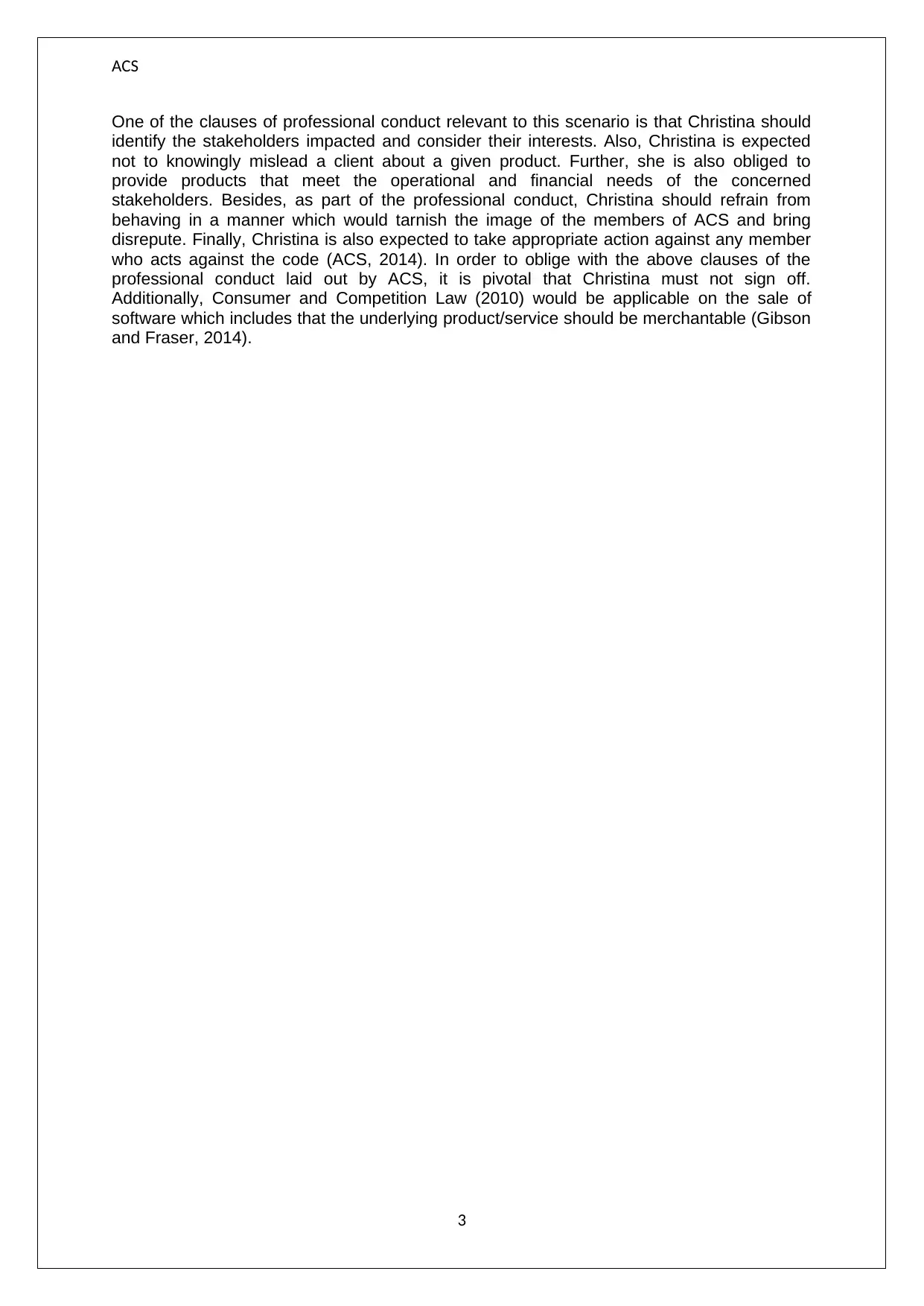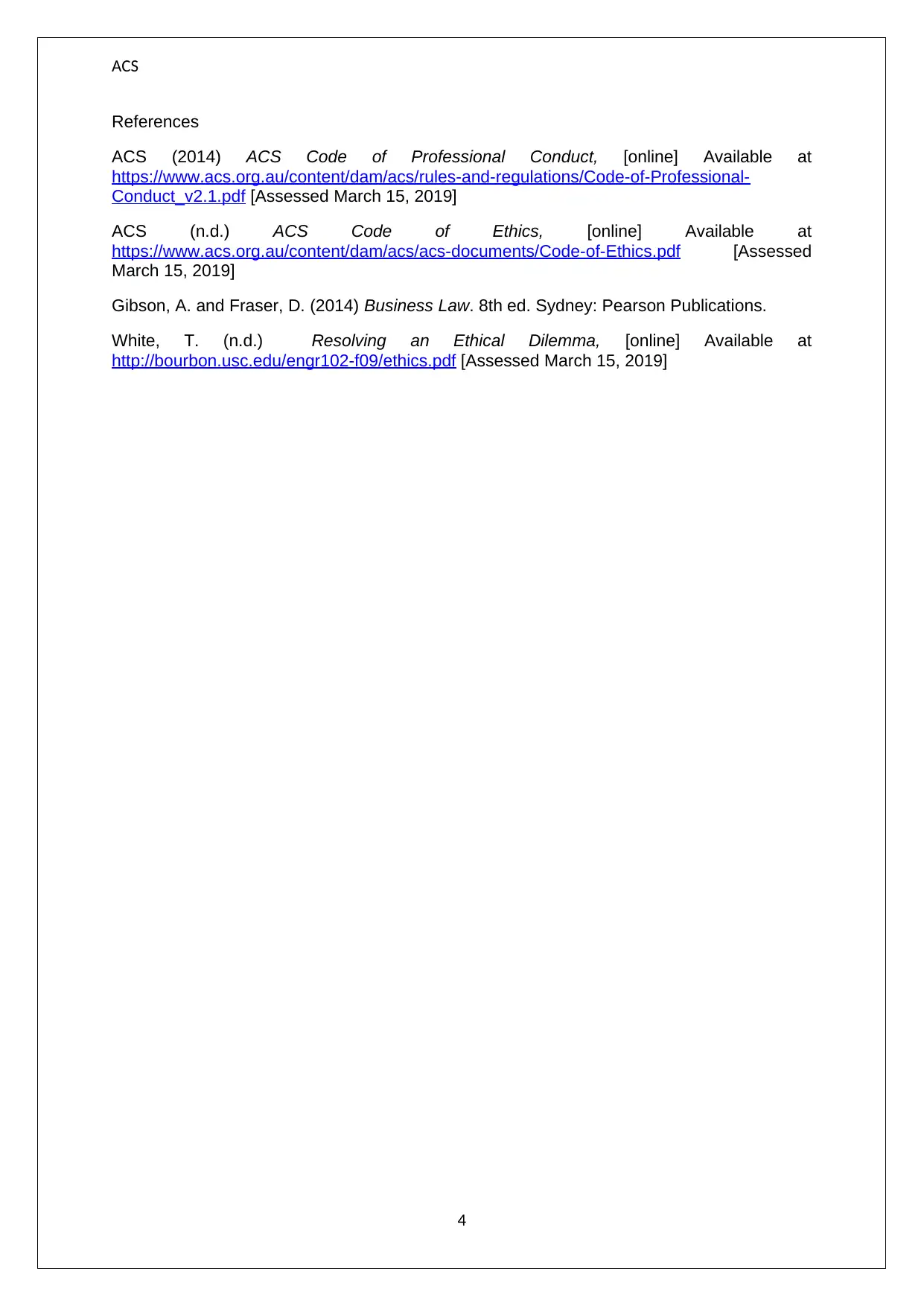Business Law Case Study: Ethical Dilemma and ACS Code of Conduct
VerifiedAdded on 2023/04/07
|4
|884
|73
Case Study
AI Summary
This case study examines an ethical dilemma faced by a software programmer, Christina, who is pressured to sign off on software testing despite the presence of bugs. The analysis utilizes the Thomas White methodology to evaluate the consequences of her actions and provides a recommendation. The assignment delves into the relevant clauses of the ACS Code of Ethics and Professional Conduct, emphasizing the importance of public interest, honesty, and professionalism. The analysis also considers the Consumer and Competition Law, highlighting the requirement for merchantable products. The study concludes that Christina should not sign off on the testing, upholding ethical standards and protecting stakeholders. The document provides a comprehensive understanding of ethical decision-making in a business law context, referencing key principles and legislation.

BUSINESS LAW
ACS
STUDENT ID:
[Pick the date]
ACS
STUDENT ID:
[Pick the date]
Paraphrase This Document
Need a fresh take? Get an instant paraphrase of this document with our AI Paraphraser

ACS
Facts and Ethical Dilemma
In the given scenario, Christina is a software programmer who is responsible for
programming as well as testing of software. While testing of software packages created by
her colleague, she has come across some bugs which have been intimated to the requisite
authority. However, fixing these bugs would take time of atleast three weeks which would
shift the date of launch that has been announced by the company. The company intends to
avoid this and therefore has asked Christina to sign that the requisite tests have been
completed. The ethical dilemma is present since if she signs off then she would not be
performing her job as a professional and also roll out of a faulty software might tarnish the
reputation of the company in the long run. However, if she does not sign off, then it may
potentially cause her to lose her job and would also have an impact on the short term
reputation of the employer.
Analysis and Recommendation
The given scenario has been analysed using Thomas White methodology. The first step in
this approach is to analyse the consequences (White, nd). If Christina goes ahead and signs
off saying that the test would have been performed. In the short run, benefit would arise for
herself as it would put in the good books of the company along with the company which
would be able to launch the software on time. In the short run, the competitors would be
harmed owing to higher competition from the software. Also, the customers would be
harmed in the short term since the software contains bug. In the long run, Christina’s
interests would be harmed as her professional reputation could potentially suffer. Besides,
my employer’s reputation would be harmed in the long run since it has launched a faulty
product in the market which would be unsuccessful. The positive impact of this action in the
long run would lead to benefit for competitors.On the other hand, if Christina does not sign
off, then the interest of the employer may suffer adverse impact in the short run but would be
served well in the long run. Also, it is possible that Christina’s career growth at the current
employer may suffer but her career would not be tarnished and in the long run she can shift
to another employer. Besides, in this option, the reputation of the members of ACS would
be safeguarded.
The second step is to analyse the actions (White, nd). It is apparent that Christina is aware
about the software not being able to pass all the tests and hence giving a signoff on testing
being performed would clearly be crossing the line. It would be outrightly dishonest and
unprofessional on Christina’s part to signoff in this case. Also, through this acting, Christina
would be jeopardizing the interests of the vulnerable consumers who are relying on internal
testing being conducted for the presence of any bug before release to the public.
Considering the analysis carried out in the first and the second step, the recommended
action for Christina would be not to sign off regarding the testing being conducted (White,
nd).
Code of Ethics/Professional Conduct/Legislation
In the given scenario, there values that are relevant from the code of ethics are primacy of
public interest, honesty and professionalism. With regards to primacy of public interest, it is
imperative that actions and decisions should put the public interest superior to the personal
and employer’s interest. In the given case, to fulfil this duty, Christina should not signoff as a
faulty product does not serve public interest. Another relevant duty is honesty whereby the
conduct of ACS members must be honest with discharging their professional duties. If
Christina would put her signature, then her conduct would not be honest. Also,
professionalism would imply integrity in behaviour so that the respect of the community is not
adversely impacted which is safeguarded by not signing off (ACS, nd).
2
Facts and Ethical Dilemma
In the given scenario, Christina is a software programmer who is responsible for
programming as well as testing of software. While testing of software packages created by
her colleague, she has come across some bugs which have been intimated to the requisite
authority. However, fixing these bugs would take time of atleast three weeks which would
shift the date of launch that has been announced by the company. The company intends to
avoid this and therefore has asked Christina to sign that the requisite tests have been
completed. The ethical dilemma is present since if she signs off then she would not be
performing her job as a professional and also roll out of a faulty software might tarnish the
reputation of the company in the long run. However, if she does not sign off, then it may
potentially cause her to lose her job and would also have an impact on the short term
reputation of the employer.
Analysis and Recommendation
The given scenario has been analysed using Thomas White methodology. The first step in
this approach is to analyse the consequences (White, nd). If Christina goes ahead and signs
off saying that the test would have been performed. In the short run, benefit would arise for
herself as it would put in the good books of the company along with the company which
would be able to launch the software on time. In the short run, the competitors would be
harmed owing to higher competition from the software. Also, the customers would be
harmed in the short term since the software contains bug. In the long run, Christina’s
interests would be harmed as her professional reputation could potentially suffer. Besides,
my employer’s reputation would be harmed in the long run since it has launched a faulty
product in the market which would be unsuccessful. The positive impact of this action in the
long run would lead to benefit for competitors.On the other hand, if Christina does not sign
off, then the interest of the employer may suffer adverse impact in the short run but would be
served well in the long run. Also, it is possible that Christina’s career growth at the current
employer may suffer but her career would not be tarnished and in the long run she can shift
to another employer. Besides, in this option, the reputation of the members of ACS would
be safeguarded.
The second step is to analyse the actions (White, nd). It is apparent that Christina is aware
about the software not being able to pass all the tests and hence giving a signoff on testing
being performed would clearly be crossing the line. It would be outrightly dishonest and
unprofessional on Christina’s part to signoff in this case. Also, through this acting, Christina
would be jeopardizing the interests of the vulnerable consumers who are relying on internal
testing being conducted for the presence of any bug before release to the public.
Considering the analysis carried out in the first and the second step, the recommended
action for Christina would be not to sign off regarding the testing being conducted (White,
nd).
Code of Ethics/Professional Conduct/Legislation
In the given scenario, there values that are relevant from the code of ethics are primacy of
public interest, honesty and professionalism. With regards to primacy of public interest, it is
imperative that actions and decisions should put the public interest superior to the personal
and employer’s interest. In the given case, to fulfil this duty, Christina should not signoff as a
faulty product does not serve public interest. Another relevant duty is honesty whereby the
conduct of ACS members must be honest with discharging their professional duties. If
Christina would put her signature, then her conduct would not be honest. Also,
professionalism would imply integrity in behaviour so that the respect of the community is not
adversely impacted which is safeguarded by not signing off (ACS, nd).
2

ACS
One of the clauses of professional conduct relevant to this scenario is that Christina should
identify the stakeholders impacted and consider their interests. Also, Christina is expected
not to knowingly mislead a client about a given product. Further, she is also obliged to
provide products that meet the operational and financial needs of the concerned
stakeholders. Besides, as part of the professional conduct, Christina should refrain from
behaving in a manner which would tarnish the image of the members of ACS and bring
disrepute. Finally, Christina is also expected to take appropriate action against any member
who acts against the code (ACS, 2014). In order to oblige with the above clauses of the
professional conduct laid out by ACS, it is pivotal that Christina must not sign off.
Additionally, Consumer and Competition Law (2010) would be applicable on the sale of
software which includes that the underlying product/service should be merchantable (Gibson
and Fraser, 2014).
3
One of the clauses of professional conduct relevant to this scenario is that Christina should
identify the stakeholders impacted and consider their interests. Also, Christina is expected
not to knowingly mislead a client about a given product. Further, she is also obliged to
provide products that meet the operational and financial needs of the concerned
stakeholders. Besides, as part of the professional conduct, Christina should refrain from
behaving in a manner which would tarnish the image of the members of ACS and bring
disrepute. Finally, Christina is also expected to take appropriate action against any member
who acts against the code (ACS, 2014). In order to oblige with the above clauses of the
professional conduct laid out by ACS, it is pivotal that Christina must not sign off.
Additionally, Consumer and Competition Law (2010) would be applicable on the sale of
software which includes that the underlying product/service should be merchantable (Gibson
and Fraser, 2014).
3
⊘ This is a preview!⊘
Do you want full access?
Subscribe today to unlock all pages.

Trusted by 1+ million students worldwide

ACS
References
ACS (2014) ACS Code of Professional Conduct, [online] Available at
https://www.acs.org.au/content/dam/acs/rules-and-regulations/Code-of-Professional-
Conduct_v2.1.pdf [Assessed March 15, 2019]
ACS (n.d.) ACS Code of Ethics, [online] Available at
https://www.acs.org.au/content/dam/acs/acs-documents/Code-of-Ethics.pdf [Assessed
March 15, 2019]
Gibson, A. and Fraser, D. (2014) Business Law. 8th ed. Sydney: Pearson Publications.
White, T. (n.d.) Resolving an Ethical Dilemma, [online] Available at
http://bourbon.usc.edu/engr102-f09/ethics.pdf [Assessed March 15, 2019]
4
References
ACS (2014) ACS Code of Professional Conduct, [online] Available at
https://www.acs.org.au/content/dam/acs/rules-and-regulations/Code-of-Professional-
Conduct_v2.1.pdf [Assessed March 15, 2019]
ACS (n.d.) ACS Code of Ethics, [online] Available at
https://www.acs.org.au/content/dam/acs/acs-documents/Code-of-Ethics.pdf [Assessed
March 15, 2019]
Gibson, A. and Fraser, D. (2014) Business Law. 8th ed. Sydney: Pearson Publications.
White, T. (n.d.) Resolving an Ethical Dilemma, [online] Available at
http://bourbon.usc.edu/engr102-f09/ethics.pdf [Assessed March 15, 2019]
4
1 out of 4
Your All-in-One AI-Powered Toolkit for Academic Success.
+13062052269
info@desklib.com
Available 24*7 on WhatsApp / Email
![[object Object]](/_next/static/media/star-bottom.7253800d.svg)
Unlock your academic potential
Copyright © 2020–2026 A2Z Services. All Rights Reserved. Developed and managed by ZUCOL.
